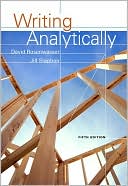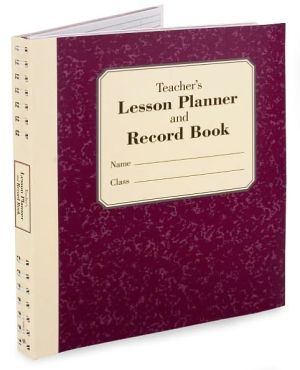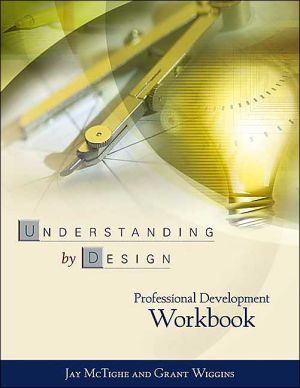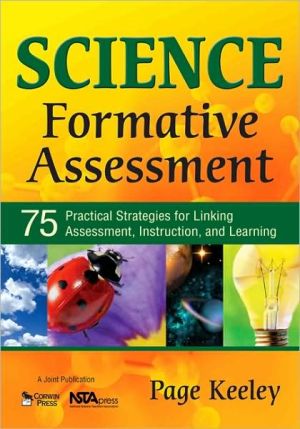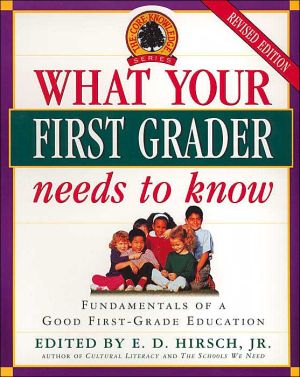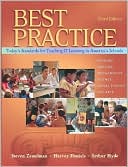Writing Analytically
Search in google:
The popular, brief rhetoric that treats writing as thinking, WRITING ANALYTICALLY, Fifth Edition, offers a series of prompts that lead you through the process of analysis and synthesis and help you to generate original and well-developed ideas. The book's overall point is that learning to write well means learning to use writing as a way of thinking well. To that end, the strategies of this book describe thinking skills that employ writing. As you will see, this book treats writing as a tool of thought—a means of undertaking sustained acts of inquiry and reflection.
UNIT I: THE ANALYTICAL FRAME OF MIND: INTRODUCTION TO ANAL YTICAL METHODS. 1. Analysis: What It Is and What It Does. First Principles / Analysis Defined / The Five Analytical Moves / Analysis at Work: A Sample Paper / Distinguishing Analysis from Argument, Summary, and Expressive Writing / Applying the Five Analytical Moves: the Example of Whistlers Mother / Analysis and Personal Associations / Assignment: Analyze a Portrait or Other Visual Image. 2. Counterproductive Habits of Mind. Fear of Uncertainty / Prejudging / Blinded by Habit / The Judgment Reflex / Generalizing / Overpersonalizing (Naturalizing Our Assumptions) / Opinions (Versus Ideas) / What It Means to Have an Idea / Rules of Thumb for Handling Complexity / Assignment: Observation Practice. 3. A Toolkit of Analytical Methods. Paraphrase X 3 / Notice-and-Focus (Ranking) / 10 on 1 / The Method: Working with Patterns of Repetition and Contrast / Freewriting / Assignments: Using the Toolkit. 4. Interpretation: What It Is, What It Isnt, and How to Do It. Pushing Observations to Conclusions: Asking So What? / Asking So What?: An Example / Implications versus Hidden Meanings / The Limits on Interpretation / Intention as an Interpretive Context / The Fortune Cookie School of Interpretation / The Anything Goes School of Interpretation / Seems to Be About X But Could Also Be (Is 'Really') About Y / Putting It All Together: Interpretation of a New Yorker Cover / Assignments: Writing an Interpretive Essay. 5. Analyzing Arguments. A Procedure for Reformulating Binaries in Argument / Uncovering Assumptions (aka Reasoning Back to Premises) / Uncovering Assumptions: A Brief Example / A Procedure for Uncovering Assumptions / Analyzing an Argument: The Example of 'Playing By the Antioch Rules' / Strategies for Developing an Argument by Reasoning Back to Premises / The Problems with Debate-Style Argument / Seeing the Trees as Well as the Forest: Toulmin and the Rules of Argument / Refining Categorical Thinking: Two Examples / A Brief Glossary of Common Logical Errors / Assignments: Analyze or Produce an Argument. 6. Topics and Modes of Analysis. Rhetorical Analysis / Summary / Personal Response: The Reaction Paper / Agree/Disagree / Comparison/Contrast / Definition / Assignments: Using the Topics and Modes of Analysis. UNIT II: WRITING THE ANALYTICAL ESSAY. 7. What Evidence Is and How It Works The Function of Evidence / The Missing Connection: Linking Evidence and Claims / 'Because I Say So' / Unsubstantiated Claims / Distinguishing Evidence from Claims / Giving Evidence a Point: Making Details Speak / What Counts as Evidence? / Kinds of Evidence / Using What You Have / Assignment: Distinguishing Evidence from Claims. 8. Using Evidence to Build a Paper: 10 on 1 versus 1 on 10. Developing a Thesis Is More Than Repeating an Idea (1 on 10) / Whats Wrong with Five-Paragraph Form? / Analyzing Evidence in Depth: 10 on 1 / Pan, Track, and Zoom: Using 10 on 1 to Build a Paper / Converting 1 on 10 into 10 on 1: A Student Paper (Flood Stories) / Doing 10 on 1: A Student Paper (Good Bye Lenin!) / A Template for Organizing Papers Using 10 on 1: An Alternative to Five-Paragraph Form / Assignment: Writing a Paper Using 10 on 1. 9. Making a Thesis Evolve. What a Strong Thesis Does / Making a Thesis Evolve: A Brief Example (Tax Laws) / The Reciprocal Relationship between Thesis and Evidence: The Thesis as Lens / What a Good Thesis Statement Looks Like / Six Steps for Making a Thesis Evolve / Evolving a Thesis in an Exploratory Draft: A Student Draft on Las Meninas / Evolving a Thesis in a Later-Stage Draft: The Example of Educating Rita / Locating the Evolving Thesis in the Final Draft / Assignments: Using the Six Steps for Making a Thesis Evolve. 10. Structuring the Paper: Forms and Formats. Romantics versus Formalists / The Two Functions of Formats: Product and Process / Classical Forms and Formats / Writing Analytically's Forms and Formats / The Shaping Force of Thesis Statements / The Shaping Force of Transitions / The Shaping Force of Common Thought Patterns: Deduction and Induction / Thesis Slots / Negotiating Disciplinary Formats / Three Common Organizing Strategies / Structuring the Paragraph / Finding the Skeleton of an Essay: An Example ('September 11th: A National Tragedy'?) / Assignments: Finding Organizing Principles. 11. Introductions and Conclusions. Introductions and Conclusions as Social Sites / What Introductions Do: 'Why What Im Saying Matters' / Putting an Issue or Question in Context / How Much to Introduce Up-Front: Typical Problems / Using Procedural Openings / Good Ways to Begin / What Conclusions Do: The Final So What? / Solving Typical Problems in Conclusions / Introductions of Reports in the Sciences / Conclusions in the Sciences: The Discussion Section / Assignments: Analyzing Introductions and Conclusions. 12. Recognizing and Fixing Weak Thesis Statements. Five Kinds of Weak Thesis Statements and How to Fix Them / Weak Thesis Type 1: The Thesis Makes No Claim / Weak Thesis Type 2: The Thesis Is Obviously True or Is a Statement of Fact / Weak Thesis Type 3: The Thesis Restates Conventional Wisdom / Weak Thesis Type 4: The Thesis Bases its Claim on Personal Conviction / Weak Thesis Type 5: The Thesis Makes an Overly Broad Claim / How to Rephrase Thesis Statements: Specify and Subordinate / Is It Okay to Phrase a Thesis as a Question? / Assignment: 'Love Is the Answer'? Analyzing Clich's. UNIT III: WRITING THE RESEARCHED PAPER. 13. Reading Analytically. How to Read: Words Matter / Becoming Conversant Instead of Reading for the Gist / The Pitch, the Complaint, and the Moment / Uncovering the Assumptions in a Reading / Reading With and Against the Grain / Using a Reading as a Model / Applying a Reading as a Lens / Assignments: Writing Analytically About Reading. 14. Using Sources Analytically: the Conversation Model. 'Source Anxiety' and What to Do About It / The Conversation Analogy / Ways to Use a Source as a Point of Departure / Six Strategies for Analyzing Sources / Assignments: Conversing with Sources. 15. Organizing and Revising the Research Paper: Two Sample Essays. A Sample Research Paper and How to Revise It: The Flight from Teaching / Strategies for Writing and Revising Research Papers / A Good Sample Research Paper: Horizontal and Vertical Mergers . . . / Guidelines for Writing the Researched Paper Assignments: Exercises in Researched Writing. 16. Finding, Citing, and Integrating Sources. Getting Started / Electronic Research: Finding Quality on the Web by Kelly Cannon, Reference Librarian / Plagiarism and the Logic of Citation / How to Cite Sources / How to Integrate Quotations into Your Paper / How to Prepare an Abstract / Guidelines for Finding, Citing, and Integrating Sources / Assignment: A Research Sequence. UNIT IV: GRAMMAR AND STYLE. 17. Style: Choosing Words for Precision, Accuracy, and Tone. Not Just Icing on the Cake: Style Is Meaning / Making Distinctions: Shades of Meaning / Choosing Words: Some Rhetorical Considerations / Assignment: Style Analysis. 18. Style: Shaping Sentences for Precision and Emphasis. How to Recognize the Four Basic Sentence Types / Coordination, Subordination, and Emphasis / Periodic and Cumulative Sentences: Two Effective Sentence Shapes / Cutting the Fat / Assignments: Stylistic Analysis. 19. Common Grammatical Errors and How to Fix Them. Why Correctness Matters / The Concept of Basic Writing Errors (BWES) / What Punctuation Marks Say: A Quick-Hit Guide / Nine Basic Writing Errors and How to Fix Them / Glossary of Grammatical. Terms / Assignment: Grammar and Style Quiz.
